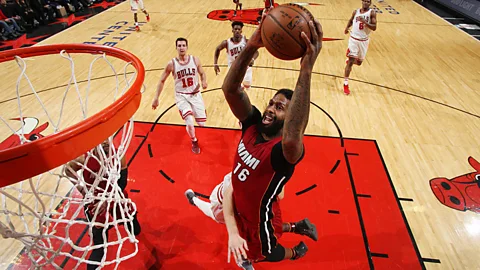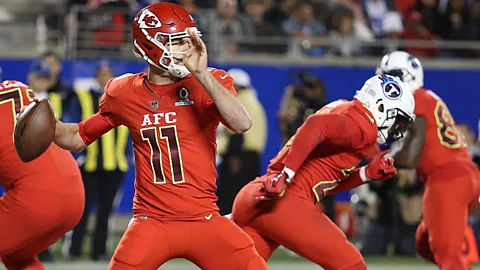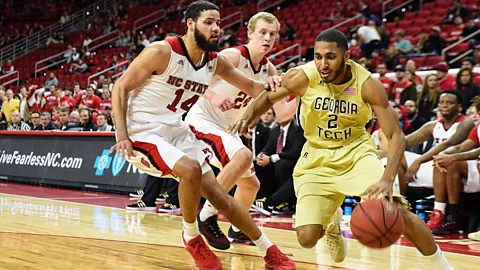For a slam dunk at work, know these sport terms
 NBAE via Getty Images
NBAE via Getty ImagesDon't follow sport? You risk being a loser in the workplace unless you cover these bases
Lydia Evans is used to jargon. At the insurance firm where she works in Toronto, Canada, terms like “risk premium component” and “subrogation” may sound like a foreign language to an outsider, but make complete sense to her.
But other terms she hears bandied about by colleagues such as “full-court press”, “Hail Mary” or “Monday morning quarterback” had her completely baffled at first. More than a few times, it felt like her lack of knowledge about sports was holding her back.
“Especially in sales meetings,” she recalls. “They use a lot of [American] football and basketball terms. Anything that has to do with strategy and goals, that’s where you hear a lot of sports terminology.” She says she gets quiet when terms she isn’t familiar with are used, which means she isn’t participating or making connections with people like she should.
 Orlando Sentinel/TNS via Getty Images
Orlando Sentinel/TNS via Getty ImagesDoes sport-talk matter?
Conversations about sport at work can boost morale and improve mood, motivation and productivity, according to a 2006 study conducted in the UK. The Impact of Sport in the Workplace, commissioned by recruitment and talent management consultancy Hudson, polled 2,000 people and set out to assess the impact of sporting success and failure on the UK workplace.
“Sport creates a glue and a fabric and it becomes part of the office culture,” says Tim Drake, Hudson’s head of talent management in the UK. “It acts as a precursor or gateway into a more serious topic.”
Like the weather, or the commute to work, sport is often used as a topic for sociable small talk. Sometimes this extends into professional conversations that we have, when talk about tactics and goals is sprinkled with sporting metaphors.
 Icon Sportswire/Corbis via Getty Images
Icon Sportswire/Corbis via Getty ImagesThe degree to which this occurs varies greatly between workplaces. And, of course, not everyone follows the same sports and it’s not always men who are more likely to be sports fans than women, even though many of us perceive that to be the case.
Getting in on the action
Of course, where there’s a perceived deficit, there’s often a service or product to help resolve it. Three years ago, Evans — now in her mid-30s — signed up to The Gal’s Got Game, an online sports explainer aimed at women. Their daily free email “cheat sheet” contains news nuggets about baseball, football, basketball, ice hockey and other sports to serve as a quick and easy way to take part in conversations about sport without having to watch the matches. The group also runs seminars and events. Evans, for instance, attended a baseball game with 30 other women from the financial sector with The Gal’s Got Game.
 The Gal’s Got Game
The Gal’s Got GameToronto-based The Gal’s Got Game was co-founded as a passion project six years ago by Lally Rementilla, a chief financial officer at an alternative lender offering businesses capital-raising options beyond traditional bank loans.
“There’s definitely a lot of sports-oriented events and conversations that happen in the workplace that really make it difficult for women to explore and expand their networks,” Rementilla says. She gives the anecdotal example of a woman partner in a law firm who told her that female colleagues often failed to take the opportunity of entertaining clients at sporting events because they weren’t personally interested or felt they wouldn’t know what to do or say.
“I didn’t grow up in Canada and didn’t know about hockey. So when hockey talk starts I would fall off the conversation,” recalls Rementilla, now in her 40s. In a previous role at a tech company she found ignorance about sport to be a real hurdle. “If I had to pitch to an older, male, grey-haired venture capitalist I had no small talk,” because I didn’t know hockey, Rementilla says.
Later, when negotiating with a bank in Boston, she made a point of keeping tabs on how the Boston Red Sox — the local Major League Baseball team — were doing in the World Series, the North American professional championship for the league. She never phoned the people she was working with at the bank during a game, and always made an appropriate remark about the team’s performance. It paid off, Rementilla says.
 Boston Red Sox/Getty Images
Boston Red Sox/Getty Images“It really went far. All the dealings I had, I inserted this about the Boston Red Sox and how they were doing well and congratulating them when they won and that went very far. It was a great collaborative way to negotiate a deal that made sense for both companies,” she says. “In professions like law and accounting it’s all about relationships; being able to foster and cultivate them and strengthen them over time. I really believe that sport makes a big difference.”
What about the boy’s club?
So are men using sports talk to exclude women and create an unofficial “boys” club’ inside workplaces? “I don’t think it’s intentional,” says Dr Kim Elsesser, expert on psychology and gender, and author of Sex and the Office: Women, Men and the Sex Partition That’s Dividing the Workplace. “The way men deal with their friendships is much different from women’s friendships. Men don’t talk about personal things as much as women do so they talk about things like sports and their conversations tend to be more competitive.”
And it certainly isn’t just women who are flummoxed by sports patter. New York City-based online sports update service TipOffSports, which dubs itself “the newsletter for the sports novice” has around 60,000 subscribers, of whom 42% are men.
“Not knowing about sports events and not understanding basic sports jargon has the potential to hold people back in the workplace,” cofounder Todd Arky says.
TipOffSports’ twice-weekly free email newsletter includes Watercooler Words — a suggested comment about one of the major sports topics of the day.
“Having even the slightest heads-up about the major sports news of the day helps to join the conversation and show that you can hang in the conversation despite sports not being a major area of interest,” Arky says.
For Evans, it has helped her build wider networks. “When you have the knowledge, you are comfortable bonding with people anywhere at any time in your workplace, in the elevator. It’s critical if you want to advance in your career.”
Of course, it might seem a bit unfair that non-sports fans should have to swot up on playoffs to stay competitive at work. But that’s missing the point, Rementilla says.
“We don’t really think of it in terms of fairness,” she says. “I’ve been in the technology industry all my life, but I’m not an engineer. So I do have to keep up with what’s happening in technology. If a lot of business is transacted because of sports, it’s just par for the course.”
